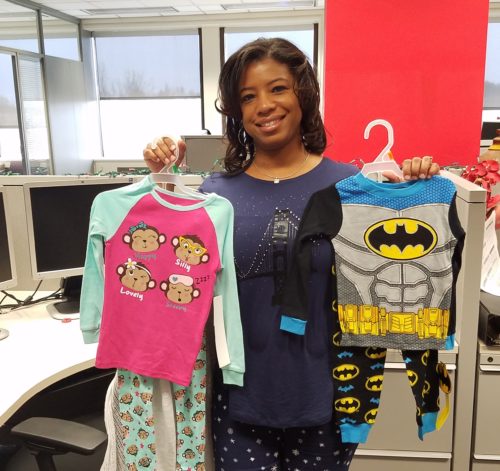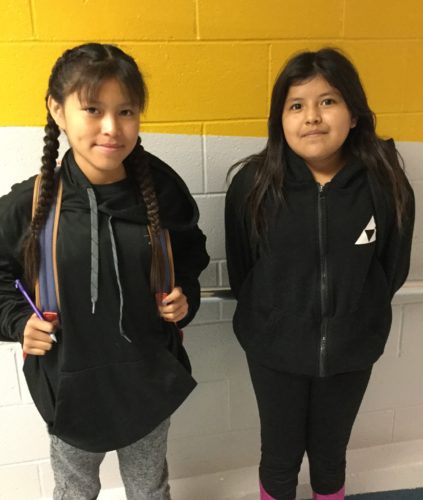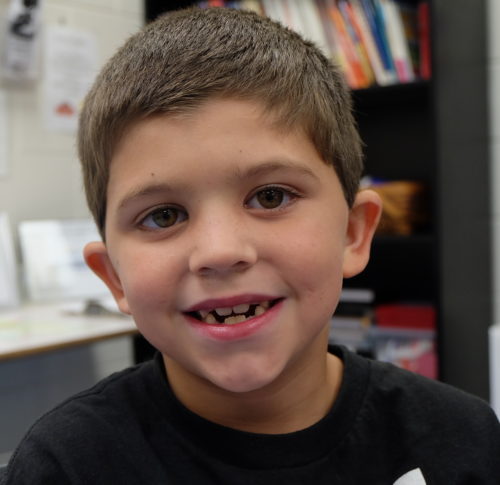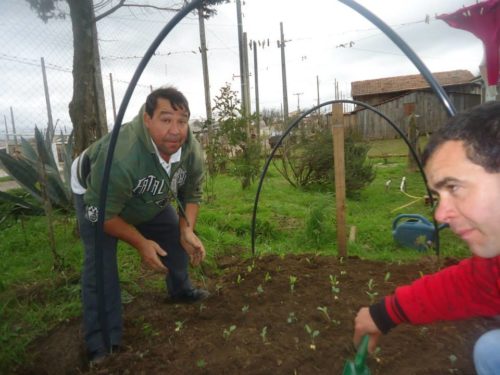Without a doubt, our volunteer coordinators are the backbone of our organization. Without help from these special teachers, guidance counselors, and resource center coordinators at our affiliated schools, we couldn’t reach thousands of children living in poverty every year, helping them to receive the basic needs they require in order to focus on getting an education.
We have found that our volunteer coordinators are just as grateful for our programs as we are for their service to the children we help to support. Over the years, our Director of U.S. Programs, Renée Kube, has received many letters from our coordinators expressing just how important Children Incorporated is to them, to the schools, and most especially to children and their families.
“We would like to thank the sponsors for their support. All children want to know they’re cared about, and I can tell you that you have provided these children with lots of smiles.”
Removing barriers
“Children Incorporated remains a crucial part of our center’s mission of removing non-cognitive barriers to our students’ education. One of the highlights of working with your organization is that volunteer coordinators are given the liberty of using the Children Incorporated funds to best meet the needs of the individual children and their families. This past school year, one of my greatest blessings was to give food assistance to my families. Our winter was one of the coldest, snowiest winters that we have had in many years. School was dismissed for multiple days at a time, meaning our students were not receiving the free breakfast and lunch meals that families had counted on as they prepared their monthly budgets. Many told me that they simply ran out of funds budgeted for food because of the repeated school cancellations. Children Incorporated allowed the center to purchase food for our families. I had never had the opportunity to work with families that were more grateful in my many years as coordinator. I, too, am incredibly grateful.”
– Vanessa, Kentucky
Mrs. Wood’s vision
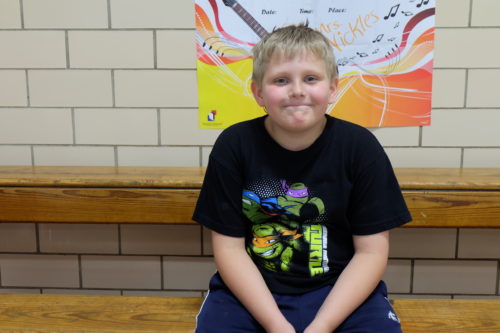
Our volunteer coordinators are incredibly grateful for the support of children in our program.
“From my experience over the last thirteen years with Children Incorporated, I have learned that the monetary help with clothing and immediate needs is really secondary to the emotional support that these children get from corresponding with their sponsors. They finally feel like someone cares and they are not alone in this world. The most gratifying thing that I have seen from the children being helped by this program is that a large number of them say that when they grow up and get a job, they want to sponsor a child themselves. We have actually had a few parents of children that were in the Children Incorporated program have their circumstances greatly improve, and so requested to have their children removed from the program so that needier children could benefit. Then, to our amazement, they proceeded to ask how they could become sponsors themselves. That in and of itself shows me the worth of this program, and what is being achieved is exactly what Mrs. Wood envisioned at its inception.
“Thank you, Children Incorporated and all of our sponsors, for the unbelievable difference you make in the lives of our children.”
– Alisa, Kentucky
Bringing smiles to kids’ faces
“Children Incorporated is truly a blessing to my community. It has brought so many smiles to the children’s faces. There are so many kids that benefit from this organization. Without the help from Children Incorporated programs, so many of our kids would do without.
“I am truly amazed with all the things that the sponsors from Children Incorporated do. To see these kids get a package from a ‘stranger’ that loves them is beyond them. It is breathtaking to see what just a note or card can do. I will never forget when one of my new students got a care package from their new sponsor. This girl was very hesitant to open the box. I explained to her that it was a gift from her sponsor and told her they wanted her to have what was inside. This girl, with a tear in her eye, said, ‘Why would anyone buy me something?’ My heart broke. I wanted to break down and cry. As she opened the box, she looked inside it with the biggest eyes. It was filled with clothes, art supplies, toys and snacks. She leaned over into the box and grabbed a box of snacks and said, ‘Wow! I finally got a snack for school. I can’t wait to show my daddy. He will be so excited.’
“As she went through her box of goodies, she showed me each piece and kept smiling and hopping around with excitement the entire time. She had to lay all her clothes out and look them over. She rubbed a soft footie to her face, and I truly cherished every moment she pulled something new out of her box.
“So many children are impacted in such positive ways by the sponsors in their lives. I cannot overstate the tremendous impact of Children Incorporated on our work, and most importantly on our students.”
“Putting a smile on a child’s face is a miracle in itself. A helping hand makes more of a difference than anyone can ever imagine. This program means the difference between a child being able to have their basic needs met for school and that same child doing without. We would like to say thank you for everything that you do for our kids. With your help, our kids can have a brighter future.”
– Alice, Kentucky
True heroes
“I truly believe Children Incorporated has made an impact on my students’ lives. I have seen their smiles, felt their hugs and their appreciation for gifts and letters of encouragement from their sponsors.”
– Deborah, Kentucky
“As I’ve said for years, the sponsors are the true heroes of the Children Incorporated program. It is amazing to think that strangers care enough about a child – a child they have never, and most likely will never, meet – to send help. I hope sponsors realize that the friendships and bonds that they create with these children are just as valuable as their monetary donations. Children Incorporated and its sponsors are changing the world one child at a time.”
– Stacy, West Virginia
“We would like to thank the sponsors for their support. All children want to know they’re cared about, and I can tell you that you have provided these children with lots of smiles. The Children Incorporated program has given our students a huge sense of pride as well as the knowledge that someone cares. Parents come in and say, ‘I appreciate the sponsorship so much.’… I’m surprised at how much people are willing to give, especially to children they’ve never seen in person. My words of thanks fall way short of conveying how important sponsors are in these kids’ lives.”
– Wally, North Carolina
A tremendous impact
“Thanks to the remarkable network of sponsors, we were able to provide required school uniforms, socks, underclothes, and winter coats, hats and gloves. We also provided a countless number of school supplies, personal care items, emergency food and more. In addition, through the Hope In Action Fund, with which Children Incorporated provides additional help in education and health matters, we were able to do three very different and significant things:
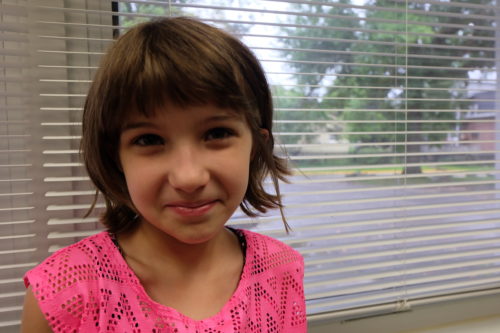
Sponsorship goes a long way in helping kids in need.
“At Lucy Ellen Moten Elementary School, where the neighborhood streets are not deemed safe enough for trick-or-treating, the coordinator was able to provide an in-school Halloween celebration, featuring a visit from a clown, and a pumpkin for every student. At Charles Hart Middle School, a family lost their medical coverage during a government shutdown, and one child could not receive her life-saving kidney medication. Children Incorporated stepped in and made it possible, and after several sleepless nights from worry, her mother wept with relief, knowing Callie* would be alright.
“At Cardozo Education Campus, a bright student could not read the board, and her grades were suffering. Her mother was struggling to make sense of the system that would allow her to get eyeglasses. The coordinator worked with the teacher and nurse to clarify the extent of the vision impairment, and through Children Incorporated, the coordinator was able to get Maxine* a proper eye exam and a pair of glasses.
“So many children are impacted in such positive ways by the sponsors in their lives. I cannot overstate the tremendous impact of Children Incorporated on our work, and most importantly on our students. Thank you so much, to the amazing sponsors and donors who make this possible!”
– Jennifer, Washington, D.C.
*Names changed for children’s protection.
***
HOW DO I SPONSOR A CHILD WITH CHILDREN INCORPORATED?
You can sponsor a child with Children Incorporated in one of three ways: call our office at 1-800-538-5381 and speak with one of our staff members; email us at sponsorship@children-inc.org; or go online to our donation portal, create an account, and search for a child that is available for sponsorship.
SPONSOR A CHILD



